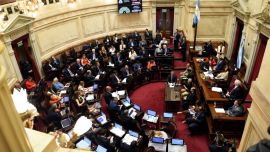Colombia is bracing for the prospect of a radical change in economic and political direction after electing a former guerrilla to the presidency on a platform of transforming the country’s business-friendly model.
Gustavo Petro, 62, defeated construction magnate Rodolfo Hernández in Sunday’s runoff vote, giving him a shot at enacting a programme that includes plans to tax big landowners, halt the awarding of oil exploration licences and revive ties with the socialist government of neighbouring Venezuela.
“It’s historic,” said Silvana Amaya, an analyst at Control Risks consultancy in Bogotá. “Colombia has traditionally voted very conservative. This marks a big change, a move to a very different economic model.”
Petro took 50.4 percent to 47.3 percent for Hernández, according to Colombia’s election authorities. He assumes office on August 7 along with his running-mate, Francia Márquez, a 40-year-old environmental activist who will become the country’s first Afro-Colombian vice-president.
“Real change is coming,” Petro said in a victory speech in Bogotá. “This is another Colombia.”
Other major Latin American nations including Brazil, Mexico, Argentina and Venezuela have all elected leftist leaders at various times, but Colombia has until now only ever been governed by conservatives and liberals. Petro’s election is also likely to shake up relations with Washington in a country that has for decades been the region’s strongest US ally.
Investor concern
He is mistrusted by many investors, especially since his plan to gradually phase out oil and coal would deprive the nation of about half of its export revenue. On top of reforming the pension and health-care systems, Petro also wants to protect local farmers and industry using import tariffs, and renegotiate trade agreements, a radical shift for a country that has liberalised commerce in recent decades.
But it is unclear how much of his agenda he’ll be able to implement given that he and his allies lack a majority in Congress.
His coalition controls 27 percent of seats in congress, while some 57 percent belong to market-friendly parties that endorsed a conservative candidate who lost in the first round and an additional nine percent are from the Green Party, according to Banco BTG Pactual SA analysts Daniel Guardiola, Alonso Aramburu and Daniel Callamand.
“Petro’s agenda seems ambitious as it seeks to reform the main pillars Colombia was built upon,” the analysts wrote in a research note. “Although some proposals are more radical than others, we believe there will be a degree of moderation, as a divided Congress with a majority from ‘pro-market’ parties will provide checks and balances against radical proposals.”
Other institutions that will provide a backstop: The constitutional court may block some of his plans, while the Central Bank’s independence is enshrined in the Constitution. He reached out to centrists during the latter stage of the campaign, alleviating some market fears.
Investors will be watching for guidance on who is appointed to the Finance Ministry and the rest of his economic team, according to Ana Vera, chief economist at Panama-based IN ON Capital.
“We expect more volatility in local markets and the weakening trend of the peso would continue,” she added.
Markets are closed on Monday for a public holiday and will reopen Tuesday.
Demanding change
Colombia now joins the ranks of nations worldwide that have voted in anti-establishment leaders. In Latin America, the demand for an alternative resonated as the pandemic caused a spike in poverty that’s been compounded by inflation at multi-year highs. In Peru, a school teacher from a Marxist party became president, while Chile elected a former student protest leader earlier this year.
Colombia, by contrast, has for decades been a bulwark of conservatism, so Petro’s win shows it is undergoing “a deep transformation in political values, in political expectations,” said Andres Mejia, a political consultant who teaches at the business school of Bogota’s Andes University.
With his platform, Petro harnessed a desire for renewal fuelled by inflation that’s accelerated to its fastest pace in more than two decades, and corruption scandals that have undercut support for the nation’s traditional ruling class under Iván Duque, the outgoing president. He promised that Colombia would lead the fight on climate change.
Still, the most likely scenario for Petro is that he becomes a Duque 2.0, said James Bosworth, the founder of Hxagon, a political risk analysis company that covers emerging markets.
“He’s someone who comes to office with lots of promises and then fails to deliver,” Bosworth said, citing Petro’s lack of a congressional coalition, his leadership style, “and the massive geopolitical winds of recession and high inflation that are playing against him.”
Gaffes and scandals
Investors preferred his opponent, Hernández, with the peso soaring as the 77-year-old businessman became the favourite after the May 29 first round. But his campaign was then damaged by gaffes and scandals, and was further undermined by his lack of a concrete programme beyond a focus on tackling graft. His concession speech lasted one minute, during which he urged Petro to “be true to his anti-corruption discourse” and not let down his supporters.
The International Monetary Fund forecasts growth of more than give percent this year, the fastest pace among major economies in the Americas. Even so, nearly half of Colombians believe conditions are getting worse, according to a recent poll by Gallup.
“The next four years look set to be bumpy for Colombia. The incoming administration has pledged populist reforms – a negative for investment and growth. That it lacks sufficient sway in congress to get its way doesn’t offer much relief – President-elect Gustavo Petro’s government may try to circumvent existing checks and balances, making for a more volatile political scene," said Felipe Hernández, Latin America economist for Bloomberg.
Peace process
Colombia is one of the closest allies of the US and has received about US$13 billion in US aid since 2000, according to the Washington Office on Latin America, an NGO. US Secretary of State Antony Blinken issued a statement saying Washinngton looked forward to working with the president-elect to further strengthen ties.
Still, Petro's election is likely to destroy the bi-partisan consensus under which Democrats and Republicans backed military cooperation and joint efforts to fight illicit drug-trafficking, according to Sergio Guzmán, director of Colombia Risk Analysis. “The Republicans are going to be very reticent about approving funding for Colombia,” he said.
Petro was a member of an illegal guerrilla group in his late teens and twenties. After demobilising as part of a peace process, he entered politics, first winning a seat in Congress then eventually becoming mayor of Bogotá. He has a net worth of about US$59,000, according to his 2020 tax return, which he posted on Twitter.
His other proposals include offering jobs for anyone who wants one in the public sector, and reforming the health system to give the state more of a presence.
The result is “great uncertainty for the country and for the Colombian economy,” said Jorge Restrepo, director of CERAC, a Bogotá-based political research group. “This is uncharted territory.”
related news

Former Menem minister Manzano backs purchase of Ecuador’s leading newspaper

Trump to host Latin American leaders, including Milei, in Miami on March 7

Echoing Trump, Milei government steps up rhetoric against illegal immigrants

Scientific analysis says climate change fuelled conditions for Chile, Argentina wildfires
by Matthew Bristow & Oscar Medina, Bloomberg


















Comments